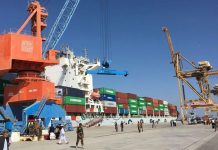SEOUL: South Korea and the United States fired off missiles Wednesday simulating a precision strike against North Korea’s leadership, in response to a landmark ICBM test described by Kim Jong-Un as a gift to “American bastards”.
Tuesday’s launch — acknowledged as an ICBM by Washington — marked a milestone in Pyongyang’s decades-long drive for the capability to threaten the US mainland with a nuclear strike, and poses a stark foreign policy challenge for Donald Trump.
The US president had vowed that “won’t happen”, but independent experts said it could reach Alaska or even further towards the continental US.
It will require a reassessment of the threat posed by the nuclear-armed North, which has carried out five atomic tests and said the multi-stage rocket’s warhead could survive atmospheric re-entry to strike a target.
Amid international condemnation of the test, South Korean and US military forces launched short-range ballistic missiles of their own less than 24 hours afterwards from the peninsula into the Sea of Japan.
Both weapons homed in on their target, the South’s Joint Chiefs of Staff said, “displaying the capability of a precision strike against the enemy headquarters in times of emergency”.
The South’s new President Moon Jae-In, who backs engagement with Pyongyang to bring it to the negotiating table, said the North’s “serious provocation required us to react with more than just a statement”.
US general Vincent Brooks, the Combined Forces commander in South Korea, said: “Self restraint, which is a choice, is all that separates armistice and war.
“As this alliance missile live fire shows, we are able to change our choice when so ordered by our alliance national leaders.”
The two countries are in a security alliance, with 28,500 US troops stationed in the South to protect it.
Their language is likely to infuriate Pyongyang, which says it needs nuclear weapons to defend itself against the threat of invasion and has been subjected to multiple sets of UN sanctions over its atomic and missile programmes.
The launches came hours after a joint appeal by the presidents of China and Russia for all sides to exercise restraint and ease tensions.
Disagreement on how best to respond will complicate discussions at the UN, where the Security Council was due to meet in emergency session later Wednesday after Secretary-General Antonio Guterres condemned the North’s launch as a “dangerous escalation.”





